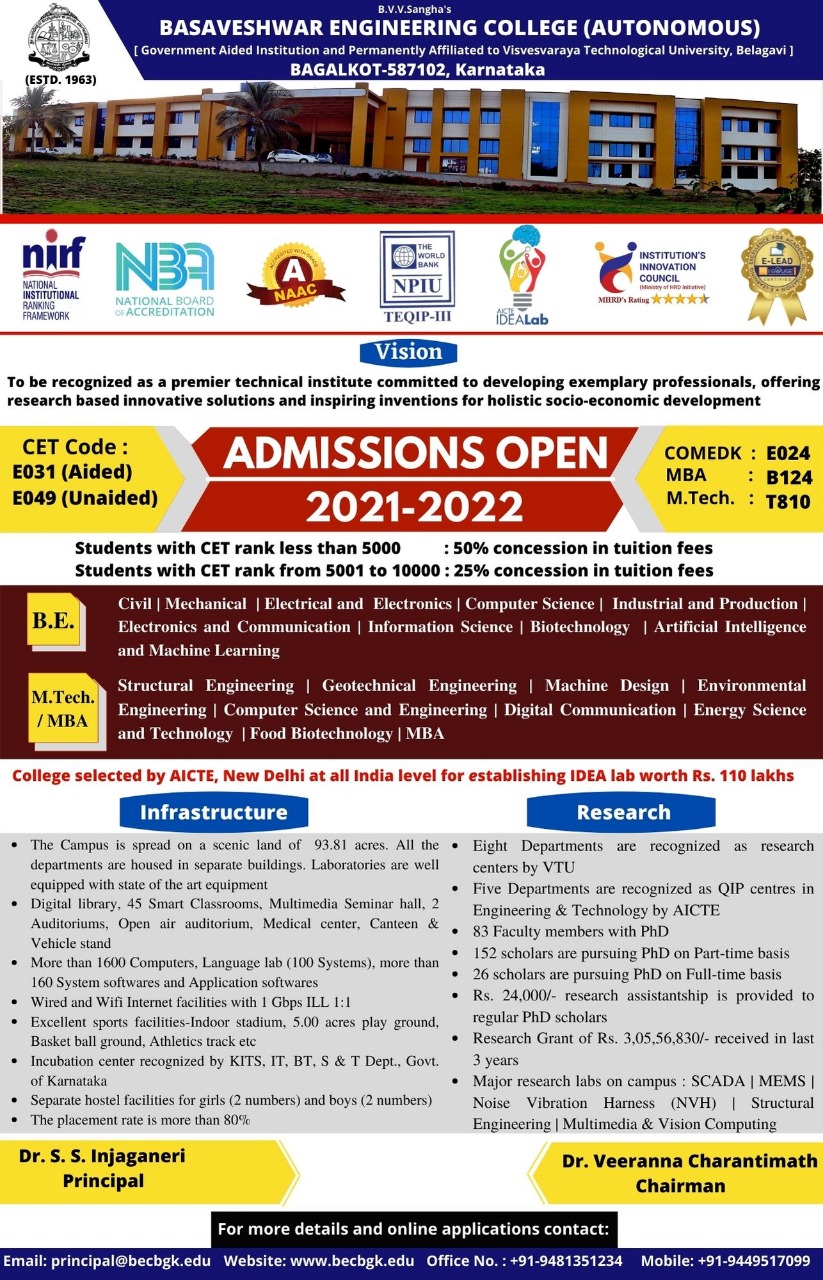TEQIP
-
The Ministry of Human Resource Development launched in December, 2004-05 the “Technical Education Quality Improvement Programme of Government of India (TEQIP)” which aims to upscale and support ongoing efforts in improving quality of technical education and enhancing existing capacities of the institutions to become dynamic, demand-driven, quality conscious, efficient and forward looking, responsive to rapid economic and technological developments occurring both at national and international levels. The Programme was conceived and designed as a long-term project to be implemented in phases to support Technical Education in the country to achieve excellence.
TEQIP PHASE- I
TEQIP Phase-I was implemented with the assistance of World Bank as a Centrally co-ordinated Central and State Sector Project with a total cost of Rs. 1389 crore. Out of this Rs. 306 crore was Central Component and the remaining Rs. 1033 crore was State Component. The program became effective in March, 2003 and closed on 31st March, 2009. 127 Institutions participated in TEQIP, out of which 18 were Centrally Funded Institutions and 109 were State Institutions. The State Institutions were from 13 States namely, Andhra Pradesh, Gujarat, Haryana, Himachal Pradesh, Jharkhand, Karnataka, Kerala, Madhya Pradesh, Maharashtra, Tamil Nadu, Uttar Pradesh, Uttarakhand and West Bengal. The 18 Central institutions include 17 NITs and NIFFT, Ranchi. The 109 State Institutions include 90 Engineering Colleges and 19 Polytechnics.The cumulative expenditure by Centre for TEQIP Phase-I was Rs. 132.80 crore which is 99% of the total Project allocation. Basaveshwar Engineering College, Bagalkot received Rs 14.16 Crores in TEQIP phase-I during which all the laboratories pertaining to UG programs were modernized and several facilities were created like Wi-Fi Internet facility, Digital library, Software related to different branches and new building for E&C Engg. Dept. etc. The sanctioned grant was properly utilised.
TEQIP PHASE- II
The college has been selected for TEQIP-II on National competition basis and is being implemented as a Centrally Sponsored Scheme (CSS) of MHRD with the assistance of the World Bank at a total cost of Rs. 2430 crore. Estimated Central Government contribution is Rs. 1895.50 crore, out of which Rs. 1395.50 crore will be reimbursed by the World Bank. The State Governments share is Rs. 518.50 crore and the Share of Private unaided institutions is Rs. 16 crores. Project cost in the Government and Government aided institutions for all sub-components will be shared between the Central Government and State Governments in the ratio of 75:25 by all but the Special Category States for whom the ratio will be 90:10. For Centrally Funded Institutions, 100% of institutional project costs will be borne by the Ministry of Human Resource Development. The project duration of TEQIP–II was 4 years. Basaveshwar Engineering College, Bagalkot has recived granted Rs. 16.57 Crores in TEQIP phase-II from World Bank. TEQIP-II was designed for scaling up of PG programs and Demand Driven Research. During this phase many research laboratories have been established and large number of faculty development and student development programs have been conducted. To increase enrolment for PG and Research programs, Scholarships are given to meritorious and eligible students under different categories on par with AICTE scholarships. To help academically weak students’ remedial classes are being conducted. To improve employability of students various skill development are being organised.
TEQIP PHASE- III
The third phase of Technical Education Quality Improvement Programme (referred to as TEQIP-III) is fully integrated with the Twelveth Five-year Plan objectives for Technical Education as a key component for improving the quality of Engineering Education in existing institutions with a special consideration for Low Income States and Special Category States (SCS) and support to strengthen few affiliated technical universities to improve their policy, academic and management practices.
Basaveshwar Engineering College (Autonomous), Bagalkot by virtue of best performing college in the TEQIP-I and TEQIP-II and on national competitive basis received Rs 8.47 Crores.
OBJECTIVES:
The Project will focus on the following objectives:
• Improving quality and equity in engineering institutions in focus states viz. 7 Low Income States (LIS ), eight states in the North-East of India, three Hill states viz. Himachal Pradesh, Jammu & Kashmir, Uttarakhand and Andaman and Nicobar Islands (a union territory (UT))
• System-level initiatives to strengthen sector governance and performance which include widening the scope of Affiliating Technical Universities (ATUs) to improve their policy, academic and management practices towards affiliated institutions, and
• Twinning Arrangements to Build Capacity and Improve Performance of institutions and ATUs participating in focus states.
SCOPE:
Only the Government and Government aided AICTE approved Engineering institutions/Engineering faculty/Engineering Teaching Department/Constituent Institutions of Universities/Deemed to be Universities and new centrally funded institutions in SCS will be the part of the project.
An estimated 200 Government and Government funded Engineering institutions including Affiliating Technical Universities (ATUs) will be selected under different sub-components in one or two cycles.
STRATEGY:
The project will be implemented in alignment with the 12th Five Year Plan (2012-17), based on faster, sustainable, and inclusive growth. It emphasizes increasing the supply of highly-skilled workers to drive the economy, as well as helping low-income states catch up with their more advanced neighbours.
The Project will be implemented through the Ministry of Human Resource Development (MHRD) of the Government of India as a Central Sector Scheme (CSS), wherein 100% funds will be provided as grants to the States, Institutions& ATUs.
The funding pattern details with respect to Government funded, Government aided institutions and ATUs are given in Section 6.
A set of Government orders for States and UTs is to be issued to achieve a high and sustained impact of the Project. These orders are to give the project institutions adequate decision-making powers that will enable and encourage them to deliver quality education and undertake research in an efficient manner. The primary focus is to increase empowerment of institutions for self-governance and create incentives for achieving excellence in engineering education.
The project institutions will be required to implement academic and non-academic reforms within their self-conceived development programmes that focus on quality and relevance, excellence, resource mobilization, greater institutional autonomy with accountability, research and equity.
Professional development programmes for engineering-education policy planners, administrators and implementers at the Central, State and University levels will be organized. The Project will also support development of more efficient governance activities.
The Project will lay major emphasis on monitoring and evaluation. The prime responsibility of monitoring will lie with the institutions themselves. The management structure at the Institutional level i.e. the Board of Governors (BoG) along with Head of the institution will monitor the progress of Institutional projects on a regular basis and provide guidance for improving the performance of institution in project implementation. The information from project institutions will be collected through a scalable web-based Management Information System (MIS). State Governments will also regularly monitor and evaluate the progress of institutions. The Government of India and the World Bank will conduct bi-annual Joint Reviews of the Project with assistance from the National Project Implementation Unit (NPIU). The monitoring will be based on Institutional Development Proposals (IDPs) and Action Plans for ATUs prepared by each project institution and achievements will be measured through a set of performance indicators. The monitoring will focus on implementation of reforms by institutions, achievements in project activities under different sub-components, procurement of resources and services, utilization of financial allocations and achievements in faculty and staff development and management development activities.
In the project, the technical assistance to AICTE is planned which will include designing an assessment system to track student learning at different points of the undergraduate program. Surveys of students, faculty, non-teaching staff and administrators will deepen insight into how institutes address specific problems related to student learning. Assessments will be designed to provide feedback to institutes on how and where to improve, without putting undue pressure on students.
In this project, the fund will be linked to the Disbursement Linked Indicators (DLIs) and will be disbursed only after achieving and verification of some of the indicators.




